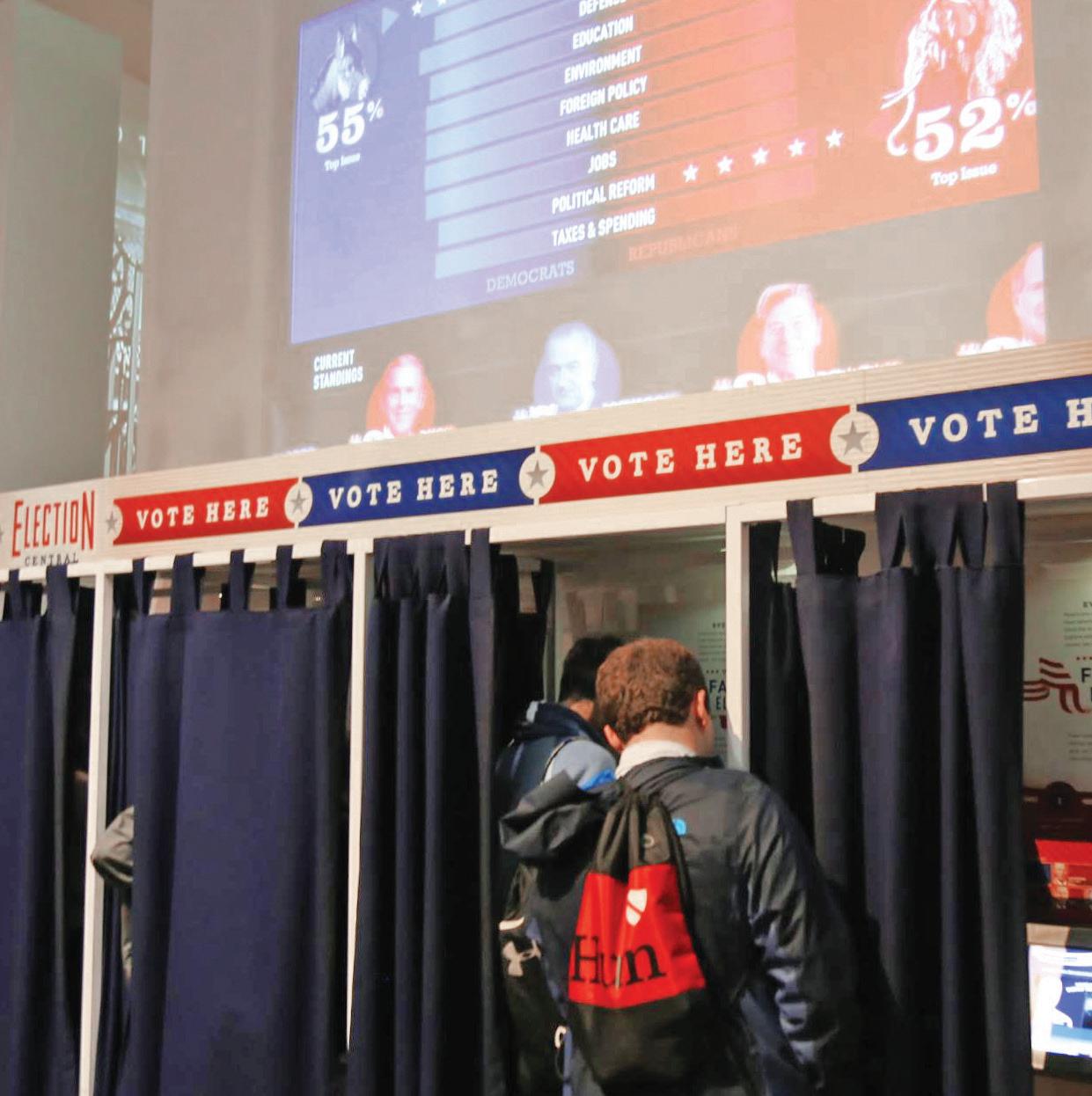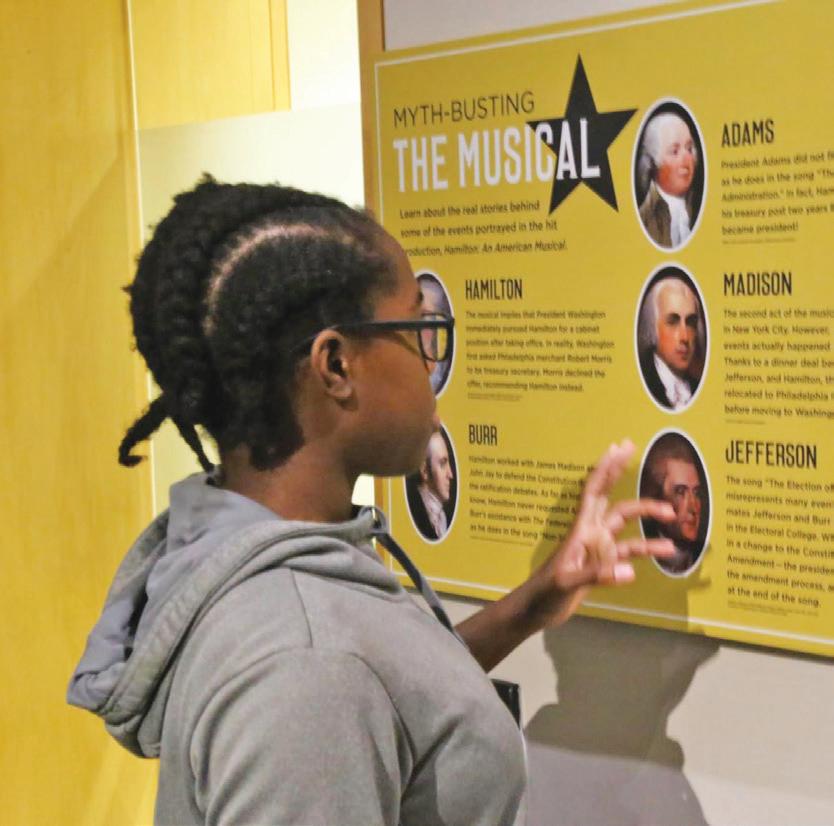
4 minute read
Teaching Civil Discourse

I think it is important for Hun students to be politically engaged because, in the age of social media, Gen Z has sparked social movements and change simply through a post. Being politically engaged gives our students a better understanding of what is going on in our world and can inspire them to make change for the better. There is no limit to what you can accomplish with this unlimited connectivity we have available to us today.”
Advertisement
— DEVON PASIEKA ’21
AGREEand DISAGREE
TEACHING CIVIL DISCOURSE AT THE HUN SCHOOL
While 2020 was a year of challenges, it was also a year of opportunities for many Hun School programs, including The John Gale Hun Program for Civics Education. Program Director Rory Hart said the presidential election (and the dialogue that went along with it) provided the perfect backdrop to engage Hun students in lessons about how to have a peaceful exchange of ideas.
“Our students have shown an impressive capacity to transcend the national culture, and the sort of gridlock we have nationally, in engaging in these conversations. The students are generally eager and willing to do that, and they’re eager and willing to do that in a productive and respectful way,” Mr. Hart said.
The program, supported by a gift from Betty Wold Johnson, exposes all Hun students to the virtues of the American republic through programming and coursework. New this year is an Academy Civics course, a required course for all tenth graders. Library and Media Center Director Laura Bishop and Mr. Hart designed the curriculum to help students understand why governments are formed, and how representative governments work. Then, students are challenged to collaborate to design a better government.
Of course, a presidential election cycle is a natural time to help students understand the virtues of civic engagement, and Mr. Hart had the entire student body involved.
Devon Pasieka ’21 is particularly involved. “Being Student Government president this year has come with a host of unique responsibilities and opportunities. One of those being making sure that Hun students are engaging with the everchanging world around them. This, of course, includes being politically engaged. As president and a civics scholar (coursework in pursuit of a Civics Scholar designated diploma), I have been working with Mr. Hart to create programs and events that will teach Hun students how to vote, debate, and use information to form their own opinions,” said.
In Hun tradition, students formed Team Trump and Team Biden and hosted a mock debate. After the debate, the students and faculty voted in a School-wide mock election (Biden, played by Devon, won the campus vote).
Student Government Vice President Anna Marie Heiser ’21 said, “The mock debate was a great opportunity to conduct in-depth research on both parties' platforms, especially since the media tends to blur the focus of policy with scandal. I was a key researcher for the Trump Administration's policies and I learned a lot about their agenda and past developments.”
Civics Scholar Brody Pasieka ’22, who played the role of Donald Trump in the mock debate, agreed. “I felt that the debate was necessary for students to see, as the policies of each candidate were not communicated effectively in the real presidential debates,” he said. Students had the opportunity to participate in virtual debate watch parties hosted by Mr. Hart and Visual Arts Teacher Marty Hoban before participating in the mock debate.
Now that the election is over, Mr. Hart is focused on keeping the momentum going on campus.
“We’re kind of in a transition point, in that we did a lot of programming leading into the election, both to ensure the School community was as well informed as possible, and to take advantage of the moment to weave together the important ideals and activities that work well with civics, but are really at the heart of a learning institution like Hun, like how to have productive dialogues,” Mr. Hart said.
Civics Scholar Owen Dougherty ’22 believes it is more important than ever for high school students to pay attention to what is happening with their government, even if they don’t think it matters to them. “I’m sure
that many kids don't pay attention to politics because they can't vote yet, but it is incredibly important to be aware of what is happening whether or not you can change what is happening… Kids from my generation will be the ones making these policy decisions a few decades from now, and almost all of our current high school students will be of voting age by the 2024 election,” he said.
Now that President Joe Biden has
assumed office, there’s much to look forward to under the umbrella of civics
education at The Hun School: Model
Congress and Model UN have been participating in virtual events, student leaders have been trained in holding effective small group discussions, and School-wide speakers are being lined up.
“This is an exciting time for this program,” Mr. Hart said. “To look at what we’ve been able to put in place in the time from the original gift to now: Expanding its footprint within the curriculum, creating opportunities for students to mobilize their experiences, and allowing them to engage in their own way, is really fantastic.” I'm sure that many kids don't pay attention to politics because they can't vote yet, but it is incredibly important to be aware of what is happening whether or not you can change what is happening. American politics are more volatile now than they have been in decades, so being aware matters that much more.”
— OWEN DOUGHERTY ’22









